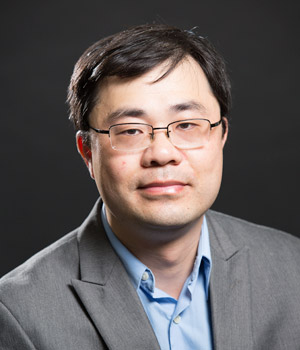
- wang289@uwm.edu
- 414-251-7477
- Engineering & Mathematical Sciences 1277
Lingfeng Wang
- Richard and Joanne Grigg Faculty Fellowship
- Professor, Electrical Engineering
- Professor, Computer Science
Education
- PhD, Electrical & Computer Engineering, Texas A&M University, College Station, Texas, 2008
- MS, Electrical & Computer Engineering, National University of Singapore, Singapore, 2002
- MS, Instrumentation Science & Engineering, Zhejiang University, Hangzhou, China, 2000
- BS, Instrumentation & Measurement, Zhejiang University, Hangzhou, China, 1997
Dr. Lingfeng Wang directs the Cyber-Physical Energy Systems Laboratory. He was previously an Assistant Professor at the University of Toledo, Ohio and an Associate Transmission Planner at the California Independent System Operator (CAISO), Folsom, California. He is an Editor of IEEE Transactions on Smart Grid, and serves on the Steering Committee for IEEE Transactions on Cloud Computing. He is also on the Editorial Board for several other international journals including Sustainable Energy Technologies and Assessments (Elsevier) and Intelligent Industrial Systems (Springer).
Research Interests
- Electric Power System Reliability
- Cyber-Physical Energy Systems
- Intelligent Control and Optimization of Power and Energy Systems
- Game-theoretic Approaches for Power Systems
- Smart grid and Renewable Energy Systems
- Microgrid Modeling and Control; Networked Microgrids
- Integration of Plug-in Hybrid Electric Vehicles; Electric Transportation
- Intelligent Transportation Systems
- Intelligent and Energy-efficient Buildings
- Cyber Vulnerability of Smart Grid
- Interdependency and Resiliency of National Critical Infrastructure
- High Performance Computing for Complex Power Grids
- Applications of Power Electronics in Power Systems
- Industrial Automation and Manufacturing
Publications
- Y. Zhang, L. Wang, Y. Xiang, and C.-W. Ten, Power system reliability evaluation with SCADA cybersecurity considerations, IEEE Transactions on Smart Grid, in press.
- R. Bulbul, P. Sapkota, C.-W. Ten, L. Wang, and A. Ginter, Intrusion evaluation of communication network architectures for power substations, IEEE Transactions on Power Delivery, in press.
- J. Tan and L. Wang, Integration of plug-in hybrid electric vehicles into residential distribution grid based on two-layer intelligent optimization, IEEE Transactions on Smart Grid, vol. 5, issue 4, pp. 1774-1784, July 2014.
- C. Adika and L. Wang, Demand side bidding strategy for residential energy management in a smart grid environment, IEEE Transactions on Smart Grid, vol. 5, issue 4, pp. 1724-1733, July 2014.
- C. Adika and L. Wang, Autonomous appliance scheduling for household energy management, IEEE Transactions on Smart Grid, vol. 5, issue 2, pp. 673-682, March 2014.
- Z. Wang and L. Wang, Negotiation agent with adaptive attitude bidding strategy for facilitating energy exchanges between smart building and utility grid, IEEE Transactions on Smart Grid, vol. 4, issue 2, pp. 702-710, June 2013.
- Z. Wang and L. Wang, Intelligent control of indoor air quality for energy- efficient buildings with CO2 predictive model, IEEE Transactions on Smart Grid, vol. 4, issue 2, pp. 686-693, June 2013.
- Y. Zhang, L. Wang, and W. Sun, Trust system design optimization in smart grid network infrastructure, IEEE Transactions on Smart Grid, Vol. 4, No. 1, pp. 184–195, March 2013.
- L. Wang, Z. Wang, and R. Yang, Intelligent multi-agent control system for energy and comfort management in smart and sustainable buildings, IEEE Transactions on Smart Grid, Vol. 3, No. 2, pp. 605-617, June 2012.
- L. Wang and C. Singh, Multi-criteria design of hybrid power generation systems based on a modified particle swarm optimization algorithm, IEEE Transactions on Energy Conversion, Vol. 24, No. 1, pp. 163-172, 2009.
- L. Wang and C. Singh, Population-based intelligent search in reliability evaluation of generation systems with wind power penetration, IEEE Transactions on Power Systems, Vol. 23, No. 3, pp. 1336-1345, August, 2008.